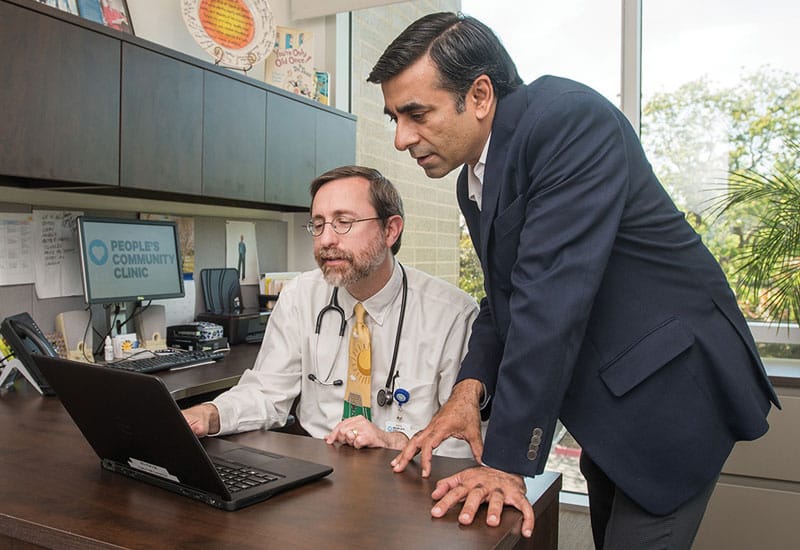Data researchers at Dell Med are collaborating with People’s Community Clinic to combat pediatric asthma with a data-driven approach — giving care teams a fuller picture of a child’s health than what a typical electronic health record affords.
For a condition like childhood asthma, clinicians at Austin-based People’s Community Clinic knew their patients’ health was affected by more than just the medications prescribed, but they had no way to track how.
Data researchers at Dell Medical School answered the call and are collaborating with People’s to combat pediatric asthma with a data-driven approach — giving care teams a fuller picture of a child’s health than what a typical electronic health record affords.
The researchers, affiliated with Dell Med’s Department of Population Health, built a secure, cloud-based environment that integrates nonmedical information into patients’ electronic medical records. At a glance, clinicians can see a patient’s medical details as usual, plus other factors affecting their health: exposure to smoke and pollen, housing conditions and transportation accessibility. Research shows these nonmedical drivers, or social determinants of health, influence more than 80% of a person’s overall well-being.
“Information about these factors — which are often the underlying, nonmedical causes of poor health — was not readily available to those who could help address these issues,” says Anjum Khurshid, director of data integration at Dell Med.
Building the tool presented Khurshid’s team with multiple challenges. The first was a technical one: learning how to extract information from outside data sources such as the Environmental Protection Agency, the Texas Commission on Environmental Quality, Pollen.com and Google Maps and then integrate the data securely into the patient’s electronic health record. The technical platform is based on research to manage personal health information securely, to use interoperability standards to link data, and to have capabilities to add new sources of data easily, including patient reported data.
The second challenge was less straightforward. The research team had to incorporate the tool into the workflow of a bustling community clinic with minimal disruption, and there was a lot to consider. Examples: At what stage of a patient’s care should teams engage the tool? Which team member would be responsible for accessing the data? And how would the data be incorporated into a treatment plan?
Expertise from the care teams at People’s drove the decision making process. Researchers spent time with provider focus groups and discussed the best ways to display that information to make it useful and easy to access. And as the tool begins to be used in the clinics with real patient data, the research team is prepared to measure its impact on the clinicians’ behavior and patient outcomes.
“It’s yet to be seen if making this information available to providers will alter how they treat and educate patients,” Khurshid says. “If they see a predicted spike in a particular allergen, are they going to contact their patients and adjust their meds? And in the end, will the tool help to improve patients’ health?”
A Model for Collaboration
Bringing together the expertise of academic researchers and community health care providers to solve a problem is an example of what Dell Med’s associate dean for research, Chris Webb, calls “radical collaboration.”
“At a time when a majority of scientific breakthroughs take decades — literally — to impact health in the real world, it’s going to take these types of cross-disciplinary partnerships to shorten that time frame from discovery to impact,” Webb says.
And scalability is crucial: Although the tool Khurshid’s team developed was built for kids with asthma, it’s also serving as a proof of concept for comprehensive health records around other conditions such as high blood pressure, diabetes and more.
“When we better understand our patients’ environment outside of the clinic walls, we have a greater ability to provide effective recommendations and treatment — potentially preventing their symptoms instead of reacting to them.”
Aliya Hussaini
Portfolio Director for Health Michael
Susan Dell Foundation
“Our vision is to expand its scope to clinics and practices across Central Texas, and then hopefully it can serve as a model globally,” says Elizabeth Matsui, professor in the departments of Population Health and Pediatrics. A pediatric allergist-immunologist and epidemiologist, Matsui serves as an adviser for this project. “Many traditional medical schools and health systems are stymied by the constraints of health care. This sort of innovation is more difficult to do in environments that don’t wholly embrace redefining how we think about helping communities become more healthy the way we do, every day, at Dell Med.”
The Michael & Susan Dell Foundation provided grant funding for the pediatric asthma pilot.

